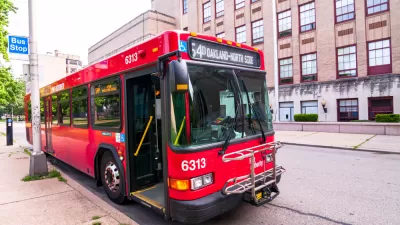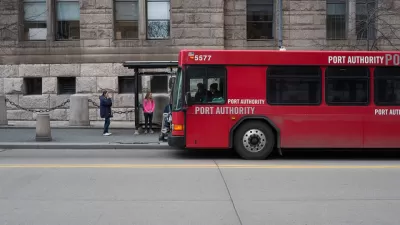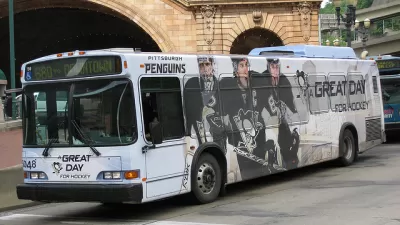The public is getting a chance to respond to the idea of building a bus rapid transit line along a heavily traveled corridor between Pittsburgh and Oakland to the east.
Melissa Daniels reports on the current state of the planning effort underway to connect Pittsburgh with the enclave of Oakland by way of a bus rapid transit (BRT) line.
"Plans for a proposed bus rapid transit system — known as BRT — between the neighborhoods continue to crystallize. The city is hosting public meetings Tuesday and Wednesday to hear opinions and answer questions related to the project and corresponding Uptown development along the Fifth-Forbes corridor. The meetings are required as part of an environmental review process for federal funding applications scheduled to be filed next year."
The article provides an introduction to BRT for the uninitiated and also presents arguments from project supporters and at least one local transit advocate who expresses skepticism about "whether those improvements would require a complete infrastructure overhaul or less costly options, such as dedicated bus lanes and stations." One thing everyone agrees on, the route has the potential to impact a lot of transit riders and neighborhoods.
Last Planetizen heard about the project was that it was proceeding too slowly, having been proposed over five years ago by a Port Authority of Allegheny County consultant, so the forward movement on exploring the idea is notable.
FULL STORY: Pittsburgh officials to hear opinions, answer questions about bus rapid transit project

Planetizen Federal Action Tracker
A weekly monitor of how Trump’s orders and actions are impacting planners and planning in America.

Maui's Vacation Rental Debate Turns Ugly
Verbal attacks, misinformation campaigns and fistfights plague a high-stakes debate to convert thousands of vacation rentals into long-term housing.

Restaurant Patios Were a Pandemic Win — Why Were They so Hard to Keep?
Social distancing requirements and changes in travel patterns prompted cities to pilot new uses for street and sidewalk space. Then it got complicated.

In California Battle of Housing vs. Environment, Housing Just Won
A new state law significantly limits the power of CEQA, an environmental review law that served as a powerful tool for blocking new development.

Boulder Eliminates Parking Minimums Citywide
Officials estimate the cost of building a single underground parking space at up to $100,000.

Orange County, Florida Adopts Largest US “Sprawl Repair” Code
The ‘Orange Code’ seeks to rectify decades of sprawl-inducing, car-oriented development.
Urban Design for Planners 1: Software Tools
This six-course series explores essential urban design concepts using open source software and equips planners with the tools they need to participate fully in the urban design process.
Planning for Universal Design
Learn the tools for implementing Universal Design in planning regulations.
Heyer Gruel & Associates PA
JM Goldson LLC
Custer County Colorado
City of Camden Redevelopment Agency
City of Astoria
Transportation Research & Education Center (TREC) at Portland State University
Jefferson Parish Government
Camden Redevelopment Agency
City of Claremont





























